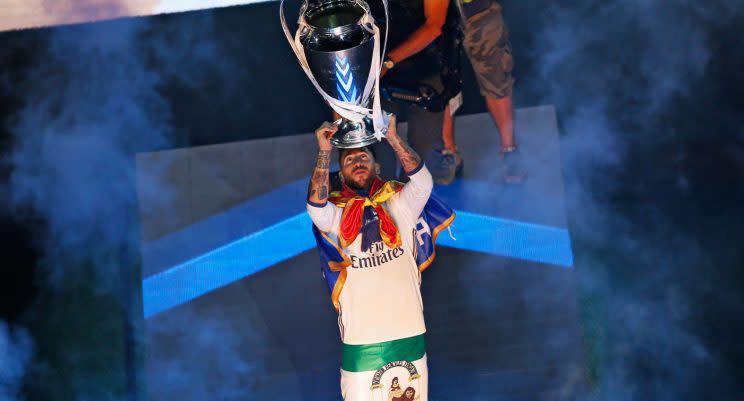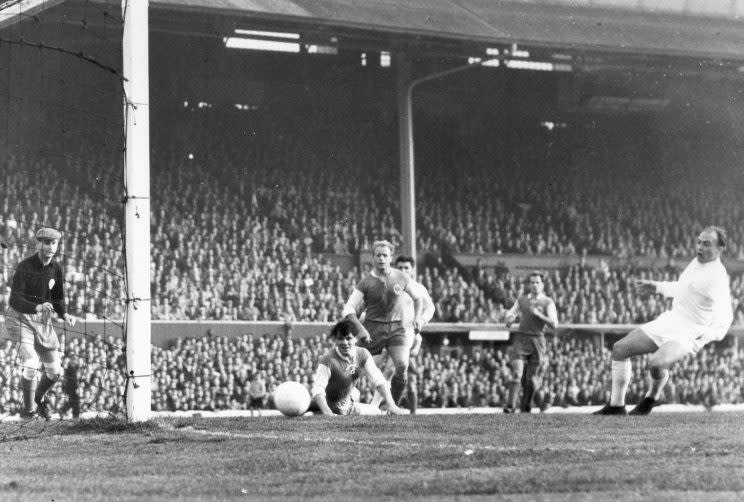Real Madrid's true golden age: Back in the day or present-day?

The stars, the trophies, the influence, the endeavor. You cannot write the history of soccer without Real Madrid. And you cannot write the history of Real Madrid without the current era.
In fact, you should probably start with the current era.
It almost rings of sacrilege to say, but neither the Spanish capital nor the world has seen a run of excellence such as this ongoing reign of club football supremacy. On the heels of the club’s third Champions League title in four years – achieved with a historic 4-1 victory in Saturday’s final over Juventus – and 12th overall, we are, quite simply, living in the golden age of Real Madrid.
[ Follow FC Yahoo on social media: Twitter | Facebook | Tumblr ]
The Champions League began as the European Cup, which started in 1956 after a pair of journalists for French newspaper L’Equipe formally proposed an annual continental club championship for the Union of European Football Associations, or UEFA. Former Real Madrid president Santiago Bernabeu Yeste saw such a tournament as the capstone for his overhaul of the club, a stage that could validate the talent he would amass through the academy he helped introduce and the world-class players he began signing.
Only, there was a decidedly ugly element to this period in Real Madrid’s history. Military dictator Francisco Franco, who ruled Spain for over three-and-a-half decades, wielded the club as a proxy for his own might, baiting defectors from Communist nations like Ferenc Puskas to join Real Madrid, as well as crushing competition elsewhere in Spain for the signatures of stars like Alfredo Di Stefano.

With Di Stefano leading the way, Real Madrid won the first five European Cups and all but one league title in the 1960s, establishing itself as the premier continental superpower. But even with many of the names from this era routinely mentioned among the greatest in club history, can this early success really be considered the golden age of Real Madrid?
With a brutalitarian knocking La Liga into a favorable imbalance? With chief rival Barcelona under severe financial straits thanks to the completion of its stadium? And with the rest of Europe largely underdeveloped from a competitive standpoint?
Besides, this current crop of Real Madrid talent may be even better. At a time when European soccer is as competitive as ever at the highest level, and when a healthy number of giant clubs can access the same money and infrastructure as one another, Real Madrid has once again seized its place as the standard.
Since the European Cup was rebranded as the Champions League in 1992, no club had ever won the title in back-to-back seasons. It’s also the first time a club has won Europe’s top trophy three times in four seasons since the mid-1970s.
There is plenty of credit to go around, but this era will always belong to Cristiano Ronaldo, the club’s all-time leading scorer and a shoo-in for his record-tying fifth Ballon D’Or next winter. Objective inference would rank the Portuguese attacker as no worse than a top-five player of all time, and probably closer to the No. 1 spot than he’s ever been before. His transformation from slender wing midfielder to hulking goal-hoarder to out-and-out No. 9 demonstrates a recognition and intelligence too many believed he lacked beneath his arrogant visage.
Ronaldo is surrounded by match-winners and international stars all over the pitch, and they’ve been together for awhile, with five players starting all three of Real Madrid’s recent Champions League triumphs and eight more featuring in at least two of them. Zinedine Zidane’s expert management has kept the tactics on point and the egos from collapsing into one another.
Real Madrid also won the Champions League three times around the turn of the century, in alternating years of 1998, 2000 and 2002. Legendary striker Raul anchored those Galacticos sides, though their domestic performance was curiously lacking as the club never finished higher than third the same season it won Europe.
A similar scrutiny is unkind to the teams of the late 1980s, when Real Madrid won five straight La Liga titles. True, this current side just snapped a five-year domestic drought, but it accumulated an average of 89.4 points in those seasons, not to mention it was going up against Barcelona’s paradigm-shifting run of success. By contrast, the late-1980s Real squads led by Hugo Sanchez accumulated an average of 85.2 points per season when adjusted for current format, and those teams never reached a European final.
At a certain point, this is all just splitting hairs. Real Madrid is without question the most successful club in history, and each era has its own greatness to offer. This is the gold standard of domestic soccer excellence.
And the golden age of Real Madrid? You’re living in it.
More soccer coverage from FC Yahoo:
• Has Ronaldo surpassed Messi as the world’s greatest player?
• Real Madrid beats Juventus for first Champions League title repeat
• Watch Mandzukic score one of the greatest Champions League final goals
• Mexico dominates Ireland 3-1 in final tuneup before a loaded summer
• Bill Hamid makes horrible goalkeeping blunder in D.C. United defeat



